There are very few films that have had such an impact on me as Taxi Driver, I was in my first year at college doing A-Levels and had a lucky couple of gaps in my timetable that gave me periods off in the afternoon. I was studying Drama and English Literature and had got into the habit of buying videos blind to take home and watch on my own whilst my parents were at work and my sister was in school, one such movie was Taxi Driver which I selected solely on the strength of its star Robert De Niro, unaware at that point who the director was.
I remember it was a bright summer’s day and I closed the curtains to darken the room, submerging myself into the mire of 1970s New York street life for the best part of two hours, completely unprepared for the terrifying but cathartic bloodbath that punctuates the film’s climax. I had seen on-screen violence in gangster films like Francis Ford Coppola’s The Godfather or Brian De Palma’s Scarface but they were very removed from my reality and depicted in an operatic or comic book fashion. Here Martin Scorsese’s carnage is all the more shocking because it’s so matter-of-fact, almost mundane and yet somewhat arbitrary that you can’t help but imagine this just might happen in real life.
Robert De Niro plays Travis Bickle, the ultimate pathological loner, a Vietnam veteran who is so dislocated from society and unable to sleep at night that he takes to working long shifts as a cab driver, a job that leads him to witness the excessive, heinous, underbelly of urban life, two decades before Mayor Rudy Giuliani’s “Zero Tolerance” policy cracked down on crime and cleaned up inner-city New York making it a much safer place for both commerce and tourism.
Whilst off-duty Travis fantasises about Betsy (Cybill Shepherd) a young woman who works at the presidential campaign offices of Senator Charles Palantine, he pictures her as a vision in pure white in stark contrast to the many prostitutes he sees working the streets at night, and yet when he finally gets the opportunity to take her out they go to see a Swedish sex education film showing in a porno theatre; illustrating how socially inept and insular he has become, as if his intractable solitude is dictating behaviour hell-bent on ensuring his isolation.
Bickle refers to himself in his journal, which serves as a narrated voice-over, as “God’s Lonely Man”, quoting from the essay by Thomas Wolfe, “The whole conviction of my life now rests upon the belief that loneliness, far from being a rare and curious phenomenon, peculiar to myself and to a few other solitary men, is the central and inevitable fact of human existence.” Screenwriter Paul Schrader said that he set out to write about the experience of circumstantial loneliness, after he left his wife for another woman who in turn quickly left him, but instead discovered that seclusion was a disease for which we must actively seek a cure.
Betsy rejects Travis and he loses the one image of chastity which he held above the filth and depravity that’s rife on the streets. Before, when Senator Palantine took a ride in his taxi, he had suggested that somebody should clean up the crime and pollution but now he decides that he must take direct action; reverting to his Marine-trained mentally, he arms himself and targets the presidential candidate, primarily because of his association to Betsy. However, Travis fails to assassinate Palantine and turns his attentions instead to Iris (Jody Foster) a child prostitute who jumped into the back of his cab one night, he makes it his mission to liberate her from her pimp, Sport (Harvey Keitel) an incredibly violent act of vigilantism which is ironically misconstrued by the press as heroic.
Taxi Driver is one of those rare ‘Gestalt-like’ moments in cinema history where a writer, a director and an actor come together and the resulting synergy unexpectedly explodes onto the screen; add to that Michael Chapman’s resourceful cinematography, given the movie’s low budget and short schedule on real locations, and the last score of legendary Hitchcock composer Bernard Herrmann and you have the perfect motion picture hard to conceive how it could be improved in any way.
Not surprisingly Sony Pictures have gone to town with the 35th anniversary Blu-ray edition, presenting Taxi Driver in a full 1080p/AVC MPEG-4 transfer that restores vibrant colour to the neon lit night scenes contrasted, with exceptional clarity, to the inky-black, smoke-filled streets of New York. On its original cinematic release Scorsese was asked to desaturate the blood to avoid an X-certificate, here the shades of red are gloriously restored. The DTS-HD 5.1 soundtrack is also a marked improvement, showcasing Bernard Herrmann’s rich jazz score with its unsettling use of harps but maintaining dialogue quality which was always somewhat muffled on previous DVD versions.
All the extras that were available on prior releases are presented here but upscaled to HD, along with some brand new material including a feature length commentary from writer Paul Schrader, a recent interview with director Martin Scorsese, a suite of short featurettes focusing on different aspects of the production, the best of which is Influence and Appreciation: A Martin Scorsese Tribute presented by Oliver Stone who was a student of Scorsese’s at NYU. There is also an interactive script-to-screen option which allows you to follow the original screenplay in detail as the film plays.
Taxi Driver is a visceral and enduring film which was the “coming of age” for three of the most distinctive voices of the 1970s boom-time in American independent cinema, they were to reach their peak and close the decade with another remarkable movie Raging Bull but that, as they say, is another story.

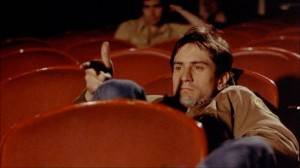
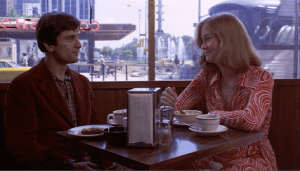
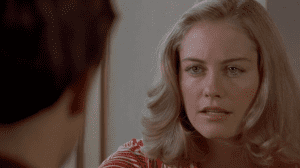
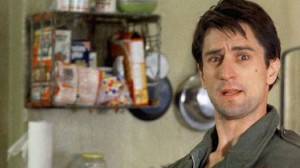
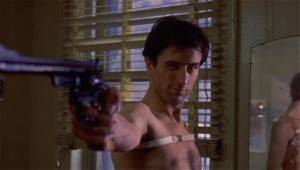
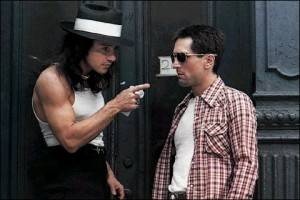
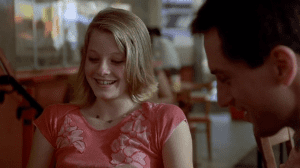
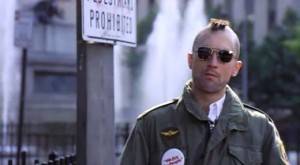
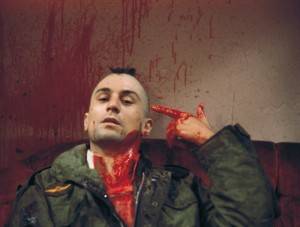
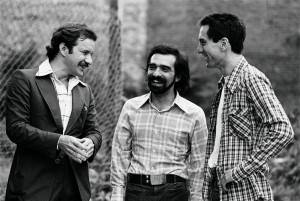
3 thoughts on “Taxi Driver”
An amazing film, and although I don’t think it’s quite the master-piece that everybody hails it as, I still do believe the direction is amazing and that De Niro couldn’t be any better. Good Review!
Good write up. This movie continues to solidify its place at the top of my seventies pantheon with each passing year. When I first saw it I was incredibly put off and didn’t know how to approach it. I have since come to appreciate it as one of the best pieces of point-of-view filmmaking. Few other films force us, in such an uncompromising way, to view the world through the eyes of its main character–in this film, an unsettling place we would rather not visit.
When I finally saw this several years ago I remember realizing why it made such an impact when it came out. It surprised me with the directions in took a couple of times. It’s not the kind of movie that I’ve ever had the desire to see a second time, though.
Comments are closed.